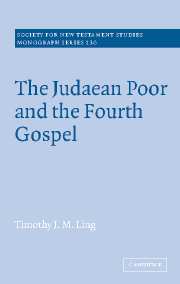5 - John's social world
Published online by Cambridge University Press: 22 September 2009
Summary
Introduction
In the previous chapters I have cautioned against overstated claims for the heuristic significance of social models. Indeed, a conscious effort has been made to engage not only with social structures and social histories but also with social actors and their practices, and to consider how all these elements of the social world interact with one another. In this context, the critical revision of the model of a normative Mediterranean honour culture has highlighted the neglect within such social approaches of religious social actors and their impact on perceptions of poverty and gender. Furthermore, it has been demonstrated that such homogenising models have repeatedly obscured the particular nature of first-century Judaea and its cultural resources, most notably its virtuoso practices, in the form of a piety of poverty. This chapter seeks to build on these insights, especially those concerning Judaea's cultural particularity. It takes as its focus the most Judaean of the Gospels, John, and asserts that its distinctiveness is most credibly accounted for in terms of Judaea's indigenous virtuosity rather than by reference to the sectarian thesis, which has emerged as something of an orthodoxy in Johannine studies. It starts by arguing that the sectarian thesis predominantly adopts its sociology anachronistically and that its application to the Gospel is programmatic. In addition, the alleged association with Qumran is based on a false premise. Whilst elements of the sectarian thesis remain suggestive, it is ultimately an inadequate social scenario.
- Type
- Chapter
- Information
- The Judaean Poor and the Fourth Gospel , pp. 146 - 212Publisher: Cambridge University PressPrint publication year: 2006



